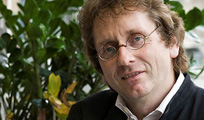Michael McDonough
Ton Venhoeven
Ahmet Hadrovic
Michael Braungart
Marcel Vroom
Wim Poelman
Rudi Daelmans
Martin Smit
Nirvana Pistoljevic
Natasa Perkovic
Sanja Durmisevic
Miriam Losse
Jan Brouwer
Martin Wollensak
Thomas Bednar
Maarten Dansen
Jaap Wiedenhoff
Adnan Pasic
Ivan Straus
Job Roos
Boran Pikula
Dzenana Bijedic
Haris Hadzialic
Ejub Dzaferovic
Almedina Hadzic
Alisa Grabus
Sanela Klaric
Azra Korjenic
Ken Yeang
Dushko Bogunovich

Lecture:
Cradle to Cradle concepts, materials, products and label
18:00h
Day two, Saturday 10 September
Collegium Artisticum, Sarajevo
MICHAEL BRAUNGART
Braugart studied Chemistry and Process Engineering in Konstanz and Darmstadt (Germany). In the 80ies he was working for Greenpeace and helped to set up the chemistry department. In 1985 he became head of the department. In the same year he did his doctorate in Chemistry at the University of Hannover. EPEA was founded in 1987.
Since that time, Michael Braungart dedicates his life to the research of and consultation for eco-effective products. Since 1994 he teaches as professor of Process Engineering at the University of Lüneburg and is head of an interdisciplinary program which does research of material flows. In 2002 he accepted a visiting professorship at the Darden School of Business (Virginia, USA), lecturing on topics such as eco-efficiency and eco-effectiveness, Cradle to Cradle®-design and intelligent materials pooling. Since 2008 he additionally teaches at the Dutch Research Institute for Transitions (DRIFT) of the Erasmus University of Rotterdam – where a chair of Cradle to Cradle® had newly been established.
Michael Braungart received several awards: Among others the Océ-van-der-Grinten-award for the development of the „Intelligent Product System“ (IPS) in 1993, the award of a circle of entrepreneurs who dedicate themselves to environment-friendly processing and management (B.A.U.M.) in Germany for his outstanding scientific achievements in 1999 and the Presidential Green Chemistry Challenge Award of the US Environment Protection Agency in 2003. His expertise is in demand all around the world.
EPEA Environmental Protection and Encouragement Agency, situated in Hamburg (Germany), was founded by Prof. Dr. Michael Braungart in 1987. It develops ecological optimized products and production systems. It evaluates and improves materials, products and systems so that they are of human, environmental and economic benefit. By material flow management it is possible to identify and avoid harmful substances in biological and technical nutrient cycles.
EPEA supports companies, institutions and local authorities who are willing to eco-effectively design their products and systems. In addition, EPEA offers a Cradle to Cradle®-certificate to products and systems that pass their design criteria.
Not only do companies seek the support of EPEA, local authorities and city councils do, too. The local authority of Venlo in the Limburg region (Netherlands) for example optimizes its environmental commitment, some North Sea islands do as well. A new cyclic way of thinking in city and landscape architecture forms an interesting challenge for architects.
EPEA is convinced that conservation can only be successful if products are designed in regard to their part of a lifecycle. This concept – the Intelligent Product System (IPS) - was developed by EPEA from 1987 to 1992.
Michael Braungart developed the important principles of EPEA, especially the Cradle to Cradle®-design concept, in co-operation with the American architect William McDonough. With their company McDonough Braungart Design Chemistry (MBDC) they work on the concept of not just being less bad, but being useful.
MBDC is a global consulting firm assisting clients to create a positive footprint on the planet by implementing the Cradle to Cradle®-framework. This concerns goal-getting, processes or product design for continuous cycling of materials. Aspects like social responsibility or water quality also play an important role.
Together with MBDC companies all around the world are enabled to not just having a less harmful footprint, but a beneficial one. Products deriving from this concept are, for example, houses which use current solar income: green roofs, intelligent alignment or solar heating systems. Houses like that produce more energy than they need.
